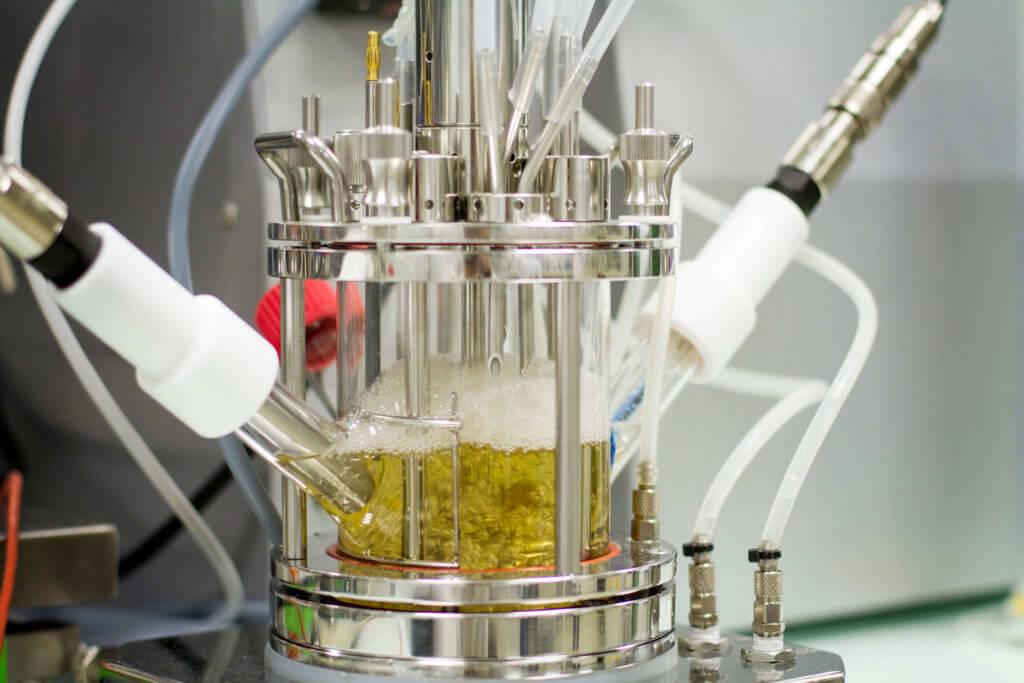Why PepsiCo, L’Oreal and Nestle are banking on this French plastics recycling startup
What has been described as a plastic-eating enzyme from Carbios helps convert polymers back to their monomer building blocks. Read More

The Carbios PET polymerization reactor can convert polymers into basic monomers within 10 hours.
That little recycling symbol on the bottom of a soda or shampoo bottle has a dirty secret. There’s only a 30 percent chance the PET plastic in the bottle will get turned into a new plastic product, and the chance it will become another soda or shampoo bottle is almost zero.
The French startup, Carbios, hopes to change that with a new enzyme — one that could usher in an entirely new way to recycle plastic, one that actually lives up to the arrows of the symbol.
As packaging professionals are well aware, most current recycling technology, which is thermo-mechanical in nature, reuses plastic by melting it and then reforming it into new products. But the process weakens the plastic and can cause aesthetic impurities in the material. What’s more, the plastic gets discolored, which can be unattractive to customers.
In the end, most plastic isn’t recycled, so much as it is downcycled. The reality is that soda bottle never will be a soda bottle again but instead it might be used in carpets and polyester textiles.
“It’s not even recycling. It’s more a possibility to reuse plastics a few times,” said Alain Marty, chief scientific officer at Carbios. “After a few cycles it’s not possible to reuse this polymer, and it’s incinerated or goes to a landfill.”
Carbios said its enzyme takes 90 percent of the polymer plastic back to the monomer building blocks in only 10 hours. The beauty of that achievement is the material is returned to its virgin form and can be used for any plastic product without limitations, the company said.
The potential of Carbios’ groundbreaking technology is further underscored by its partnerships with some of the biggest consumer goods on the globe, including PepsiCo, L’Oreal and Nestle. The small startup is backed by lead investor Truffle Capital and BOLD (Business Opportunities for L’Oreal Development), among a few others.
“The Carbios systems can take all plastic; colored PET, textiles like polyester or even carpet, which would normally be lost along the way. They can take it in and recover it,” said Ron Khan, vice president of beverage packaging at PepsiCo.
Carbios has proven its enzyme’s effectiveness on a technical level laid out in a recent Nature academic journal article. The company even has proven to Pepsi on a few pilot tests that the bottles made from Carbios recycled plastic perform like virgin PET. But now the team needs to show the process can work on a manufacturing level congruent with the massive scale of these global brands.

“They are a small technology company with brilliant [research and development] but obviously don’t have the bandwidth like ourselves,” Khan said. “We bring our knowledge about the front end of the market, the whole area around collection systems, and we have relationships with the big PET companies. So by joining together with them, we’ve been able to bring that knowledge to help them develop that end-to-end supply chain.”
To be recycled, a soda bottle takes a long journey from the consumer to a collection center, then to a material recovery center where the food-grade transparent bottles are sorted out. A specialized and massive PET processing plant melts the bottle back into a resin to sell to bottle manufacturers. But if Carbios’ technology can scale to work on the millions of bottles collected each year, the future of these PET plants will be enzyme technology replacing the inferior thermo-mechanical system.
Pepsi, L’Oreal and Nestle are leveraging their long-standing relationships with the PET plants by connecting them with Carbios to give the small company a boost. Without the networks’ knowledge and implementation of these global brands, Carbios’ enzyme is just an interesting invention, not a practical and possibly market changing tool.
In 2018, only 3 percent of Pepsi’s packaging used recycled plastic. Unlocking technology such as Carbios’ is key for Pepsi to reach its goal of 25 percent recycled packaging by 2025, Khan said.
Cosmetic and food companies such as L’Oreal and Pepsi have been looking for ways to reduce their footprint for years. Investing time and resources in these technologies is the only way these companies can create their vision of a world where plastics no longer become waste.
“Plastics are a great material,” Khan said “We use it for a reason. It’s lightweight. It’s transparent. It’s extremely hygienic. It gets our product to you in a very safe way. We want to set up the loop so at the end of the life we get that great material back and reuse it. And the relationship with Carbios will be great for that.”
Other companies are working on chemical approaches to recycling. Two notable examples are IBM, which has teamed up with the National Renewable Energy Laboratory to seek partners to scale up its VolCat technology (short for “volatile catalyst”); and Loop Industries, which also has partnered with PepsiCo and L’Oreal, as well as Danone.













